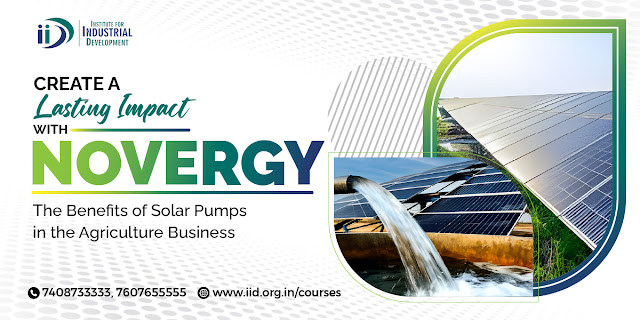Solar Pumps and its Benefits in Agriculture 2024 | Sustainable Farming
Innovation in agriculture is essential to resolving concerns about energy prices and environmental effects r while fulfilling the growing demand for food production in the dynamic field. Agriculture is seeing a rise in using solar pumps as a viable and ecological substitute for traditional pumps.
Understanding Solar Pumps
Solar pumps harness the power of the sun to move water from a source to a desired destination. The three main types include surface, submersible, and floating pumps, each serving specific purposes. Surface pumps are ideal for shallow water sources, submersible pumps for deeper waters, and floating pumps for pools or lakes. Compared to traditional pumps that rely on electricity or fuel, solar-powered pumps offer distinct environmental, cost-effective, and sustainable advantages.
IID Help to End User to improve their knowledge about Industrial Courses. IID provides an Exclusive Course about Solor Pump Technician, Solar Water Heater, Solar Panel Manufacturing, and many more.
Benefits of Solar Pumps in Agriculture 2024
- Reduction in Energy Costs: Solar pumps are powered by abundant and free solar energy, eliminating the need for costly electricity or fuel. This reduces operational expenses and makes solar pumps an economically viable option for farmers.
- Increased Productivity and Efficiency: Solar pumps tend to run more efficiently than their conventional counterparts. They can continue operating even during power outages, ensuring a consistent water supply for crops and potentially increasing overall agricultural productivity.
- Better Water Supply in Isolated Regions: Particularly beneficial in rural areas with limited access to energy or fuel, solar pumps address water scarcity issues. This makes them a practical choice for farmers in underdeveloped countries facing challenges related to water accessibility.
- Reduced Environmental Impact: Solar pumps have a minimal environmental footprint as they do not generate pollutants or impurities. This statement supports the increasing worldwide focus on sustainable and environmentally friendly methods of agriculture.
Considerations for Choosing a Solar Pump:
Several factors must be considered when selecting a solar pump for agriculture to ensure optimal performance:
- Crop Water Needs: Determine the water requirements of your crops to choose a pump with the appropriate size and horsepower.
- Pump Size and Horsepower: Make sure the size and power of the pump correspond to the amount of water your crops require. Choosing the right size pump will help you avoid inefficiencies and wasteful spending.
- Size and Capacity of the Solar Panel: The size and capacity of the solar panel affect the pump’s efficiency. Depending on the needs of your farm, select a solar panel that can effectively power the pump.
- Pump Cost: Examine the initial cost and the potential long-term return on investment. While solar pumps may have a higher initial investment, their energy savings over time often make them a cost-effective solution.
Solar Panel Installation and Maintenance Tips:
Ensuring the proper installation and maintenance of solar pumps is crucial for their safe and efficient operation:
- Right Installation Techniques: When installing, adhere to the wiring and grounding instructions provided by the manufacturer. To get the best performance, make sure the pump and solar panel are well grounded.
- Periodic Maintenance: It is important to regularly maintain the solar panel and pump system by cleaning them, checking for leaks, and testing electrical components to ensure optimal condition.
- Fixing Common Issues: Check for regular issues such as insufficient water flow, broken solar panels, or clogged pipes or pumps. It is crucial to refer to the manufacturer’s instructions or consult a qualified pump technician when in doubt.
Examples of Successful Solar Pump Implementation:
Several farms and organizations have successfully adopted solar pumps, showcasing their effectiveness in enhancing agricultural practices. For instance, the Solar Electric Light Fund (SELF) collaborated with farmers in Benin, West Africa, to implement solar irrigation equipment. The result was increased crop yields and a reduced dependence on diesel generators, demonstrating the potential of solar pumps in sustainable agriculture.
Solar pumps offer a cost-effective and environmentally responsible solution for agriculture. When selecting and installing a solar pump, various variables such as water demand, pump size, solar panel capacity, and cost analysis need to be considered. Competent installation and regular maintenance are crucial for a system to operate safely and efficiently. Farmers and agricultural organizations may increase output, save energy expenses, and help create a more sustainable future by implementing solar pumps. Utilizing solar energy, and solar pump specialists is essential to the advancement of agriculture toward a more environmentally friendly and productive future.




Comments
Post a Comment